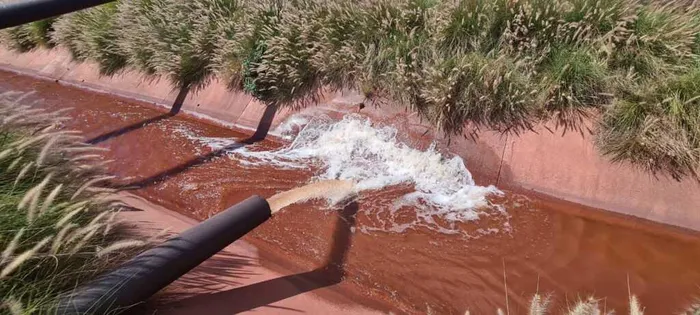Municipal water partnerships deliver results in Northern Cape mining communities

Tsantsabane and Gamagara local municipalities are seeing major improvements in water quality, infrastructure and groundwater management through a collaborative partnership driving change in South Africa’s driest province, the Northern Cape.
Image: Supplied
AN AMBITIOUS partnership between Anglo American, government and research institutions has led to measurable improvements in water quality, infrastructure and climate resilience in parts of the Northern Cape.
Aligned with the Cape Town Declaration signed at the Africa Water Investment Summit in August 2025, the Municipal Capability and Partnership Programme (MCPP) is being implemented in the Tsantsabane and Gamagara local municipalities, where Kumba Iron Ore operates. The initiative is designed to strengthen municipal capabilities and improve collaboration between industry and government.
Launched by Anglo American in partnership with the Department of Co-operative Governance and Traditional Affairs and the Council for Scientific and Industrial Research (CSIR), the programme focuses on addressing the declaration’s call for creating enabling environments for water resilience and sustainable service delivery.
Measurable improvements
Both municipalities have recorded major improvements in water quality compliance.
In Tsantsabane, Blue Drop scores rose from 0% to 56% for the Postmasburg scheme and from 50% to 56% for the Postdene and Jenn-Haven schemes. The municipality was named the third best performing Water Service Authority in the Northern Cape in 2023.
In Gamagara, Blue Drop scores increased from 11% for the Kathu Water Scheme and 0% for the Dibeng Water Scheme in 2020 to 54.71% across all schemes by 2023.
Innovative financing
The programme supports municipalities in preparing Budget Facility for Infrastructure (BFI) applications to the National Treasury – valued at R671.8 million for Tsantsabane and R1.309 billion for Gamagara – to enable bulk infrastructure development through Infrastructure South Africa (ISA). These applications are viewed as key to creating an enabling environment for both communities and businesses.
Groundwater management
Being located in South Africa’s driest province, the two municipalities are heavily reliant on groundwater. Through the MCPP, they have developed comprehensive groundwater management plans and standard operating procedures allowing teams to maintain boreholes in-house rather than depending on external contractors.
Municipal officials are also receiving training to update these plans independently, helping ensure that they remain current and relevant.
“We recognise that Anglo American’s current asset portfolio in South Africa is located in water-stressed regions,” said Musa Jack, MCPP programme manager at Anglo American. “The MCPP demonstrates how strategic partnerships can build resilient communities capable of managing water resources beyond the life of mining operations.”
Water loss reduction and data mapping
In line with climate resilience priorities, the programme has been assisting municipalities to address high levels of water losses. It donated about R900,000 worth of materials and deployed an on-site resource to help municipal plumbing teams repair leaks and conserve water.
“MCPP support made a huge difference in our Water Balance reporting, which was a foundation for our Water Conservation plan. Through the programme, accurate population data was collected and is being used for the Budget Facility for Infrastructure (BFI) application, which is going to make an enormous difference in the lives of the Gamagara LM residents once approved. The Impact of MCPP is making waves at district, provincial and national level. Impactful relationships have been formed through this programme, enabling information sharing and better understanding of the municipal environment,” said Ditebogo Sebuasengwe, Gamagara PMU manager.
Water infrastructure mapping has also expanded, with both municipalities increasing their mapped reticulation systems from 40% to 80%, improving maintenance and reducing service disruptions during extreme weather.
Building local capacity
“Access to clean and reliable water is fundamental to thriving communities,” said Thando Njoko, social performance principal at Kumba. “We are dedicated to working alongside local partners to ensure sustainable water solutions that make a meaningful difference in people’s daily lives. This initiative reflects our ongoing commitment to being a responsible partner in the communities where we operate.”
“What I value from this programme is that we've learned and achieved a lot. We started doing our own Water and Sanitation Infrastructure Operations and Maintenance Plans, Water Safety Plans, you name it. These are basic requirements for a Water Services Authority, and we did not have them in the municipality. Through the MCPP and CSIR’s implementation team, we were not only involved in compiling these instruments, but in using them and making them our own,” said Cindi Mathebula, Tsantsabane water superintendent.
Replicable model
According to the programme partners, the MCPP’s success in Gamagara and Tsantsabane demonstrates the value of collaborative models for water service delivery. By strengthening local capabilities and fostering shared responsibility, the initiative aims to improve service delivery, financial sustainability and climate resilience.
The model, they add, offers a replicable framework for water service partnerships in mining regions across Africa, showing how co-ordinated investment and co-operation can translate into practical outcomes for communities.

Tsantsabane and Gamagara local municipalities are seeing major improvements in water quality, infrastructure and groundwater management through a collaborative partnership driving change in South Africa’s driest province, the Northern Cape.
Image: Supplied